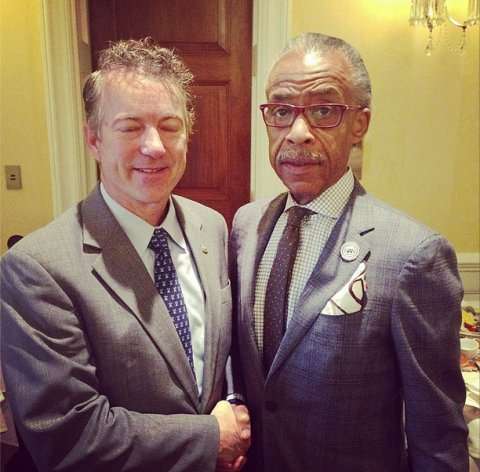Why Shouldn't Al Sharpton and Rand Paul Have Breakfast Together?
What matters isn't whether one of them is a good guy. It's whether their meeting can contribute to reform.

Last week Sen. Rand Paul (R-Ky.) had breakfast with the Rev. Al Sharpton, at Sharpton's request. The meeting appears to have been productive for both parties. Sharpton obviously isn't likely to back Paul for president, but he's taking the opportunity to put pressure on Hillary Clinton on various civil rights issues where Paul's talk has been bolder than Clinton's. Paul in turn can build up his civil rights image a little without sanctioning any of the ugliness in Sharpton's past. Put differently, both men get the advantages of a meeting without the disadvantages of an endorsement.
Naturally, Paul's critics are treating this as an endorsement anyway. Jennifer Rubin, a medium who channels neoconservative opinion for The Washington Post, put on her concern-troll hat yesterday and wrote this:
Why is Sen. Rand Paul (R-Ky.) courting Sharpton and why don't Republicans denounce him for doing so, just as they do Democrats?…If Paul wants to take on criminal justice reform, more power to him. And if he thinks this will boost him with African American voters, he won't be the first pol to try to pick agenda items that impress slices of the electorate. But in doing precisely what the administration and so many liberals do—treating Al Sharpton as a respected and important figure—he does his own credibility harm.
Somehow I have a hard time imagining Rubin reacting this way if Paul had broken bread with Dick Cheney or Sheldon Adelson.
My view? A movement to roll back mass incarceration, overcriminalization, and police militarization is more likely to succeed if it has support on both the left and the right. Sharpton has influence on the left, Paul has influence on the right, and both are open to cooperation. The sane question to ask here isn't whether either one of them is a good guy; it's whether their meeting can actually contribute to that movement in a significant way.
I'm not sure it will. It's just a breakfast, after all. But I can't imagine how refusing to meet would have helped any of those causes.


Show Comments (43)